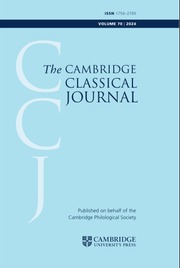Article contents
Three notes on Virgil, Aeneid 2
Published online by Cambridge University Press: 28 February 2013
Extract
Aeneas begins his narrative with the story of the Trojan Horse. The Greeks, after constructing a huge wooden horse, within which they hide a great many armed soldiers, flee the land. The Trojans rejoice, thinking that they have driven off their opponents. Lines 27–8 express the joy of the Trojans as they visit the Greek camp:
iuuat ire et Dorica castra
desertosque uidere locos litusque relictum
It is disputed whether desertos and relictum are used with an attributive or predicative function. The repeated desertus (24 huc se prouecti deserto in litore condunt, i.e. the Greeks) directs the reader's attention to its earlier use in an attributive function (‘they hid on the vacant shore of Tenedos’). The image of the deserted shore of Tenedos is clearly meant to suggest the potential destructiveness of the Doric camp and shore deserted now. Such an interpretation seems to be further supported by the predicative use of desertos and relictum, since we see the Greek camp through the eyes both of Aeneas and of his countrymen.
- Type
- Research Article
- Information
- Copyright
- Copyright © The Author(s). Published online by Cambridge University Press 2006
References
BIBLIOGRAPHY
- 1
- Cited by


